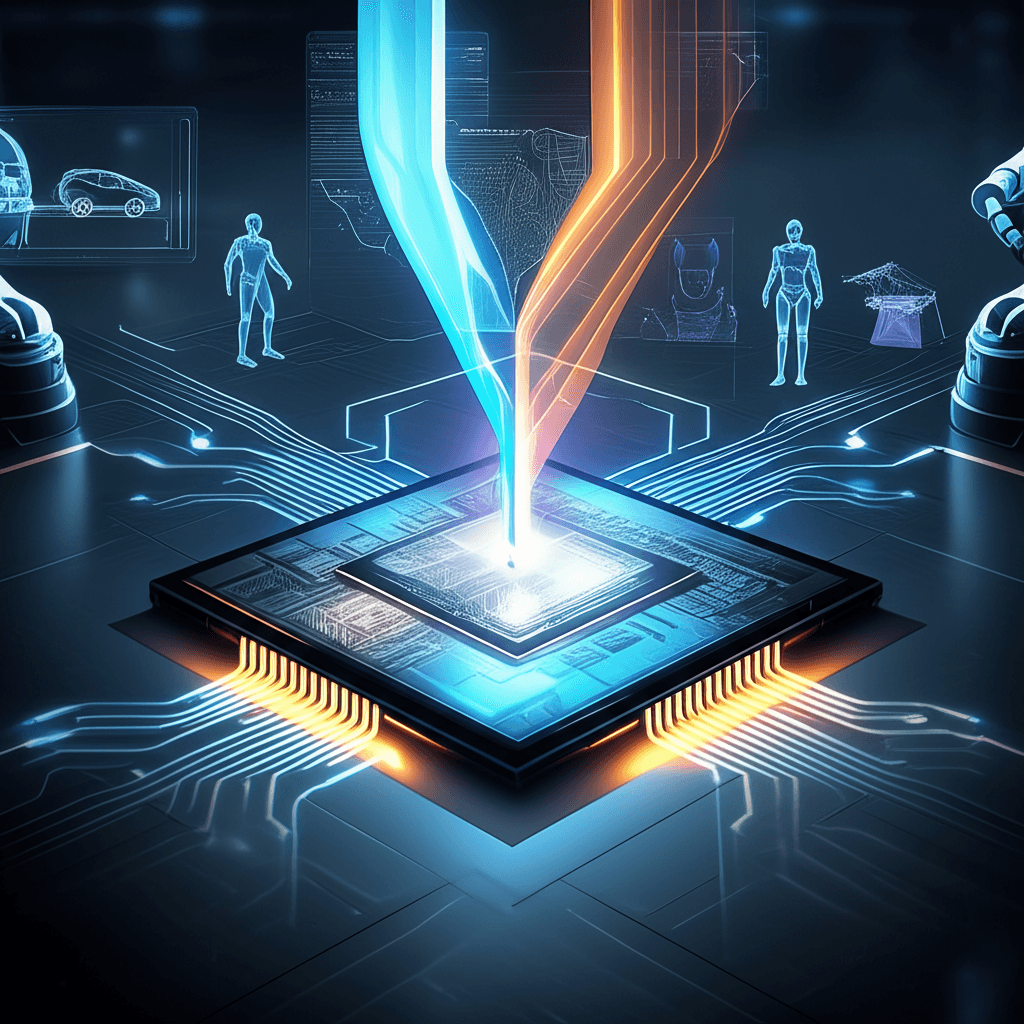Tesla, Samsung Forge $16.5 Billion Alliance for Next-Gen AI Chips
A $16.5 billion deal for AI chips boosts Tesla's autonomy drive and anchors Samsung's new Texas factory.
July 28, 2025

In a landmark agreement poised to reshape the landscape of artificial intelligence and automotive technology, Tesla has entered into a $16.5 billion deal with Samsung Electronics for the production of its next-generation AI chips. The multi-year contract, extending through the end of 2033, designates Samsung as the manufacturer for Tesla's future "AI6" processors, the custom-designed brains that will power the company's ambitious forays into autonomous vehicles and humanoid robots. This strategic alliance not only secures a critical component for Tesla's future product roadmap but also provides a vital lifeline and a significant vote of confidence for Samsung's contract chip manufacturing division, which has been striving to close the gap with industry leader Taiwan Semiconductor Manufacturing Co. (TSMC). The deal carries significant weight, impacting supply chain strategies, geopolitical considerations in the semiconductor industry, and the accelerating race to deploy advanced AI in real-world applications.
The partnership is a considerable victory for Samsung's foundry business, which has faced persistent financial losses and a struggle to attract high-profile clients for its most advanced manufacturing processes.[1][2] For years, Samsung has heavily invested in its foundry capabilities but has lagged behind TSMC, which dominates the global market with a nearly 68% share compared to Samsung's single-digit stake.[3][4] The Tesla contract, one of the largest single-client orders in Samsung's history, is expected to generate approximately 2.5 trillion won annually and provides the scale needed to improve production economies.[1] This agreement is seen by analysts as a potential inflection point, validating Samsung's technological advancements and bolstering its credibility as a viable alternative to TSMC for cutting-edge chip production.[1] The deal was significant enough to cause Samsung's shares to surge to their highest point in nearly a year following the announcement.[5] The new AI6 chips are expected to be manufactured using Samsung's advanced 2-nanometer process, a technology the company aims to have in mass production by the latter half of 2026.[1][6]
For Tesla, the agreement represents a strategic diversification of its semiconductor supply chain, a critical consideration in an era of geopolitical tensions and potential supply disruptions. The electric vehicle maker has a history of designing its own chips to optimize performance for its specific needs, starting with its move away from partners like Mobileye and Nvidia.[7][8][9][10] Samsung is not a new partner; it currently manufactures Tesla's Hardware 4.0 chip, also known as the AI4.[11][3] However, for its upcoming AI5 chip (formerly Hardware 5.0), Tesla has tapped TSMC.[11][3] By bringing Samsung back into the fold for the subsequent AI6 generation, Tesla avoids over-reliance on a single manufacturer. This dual-sourcing strategy mitigates risk and provides leverage in future negotiations. The new chips will be at the core of Tesla's future products, powering not just its Full Self-Driving (FSD) system in vehicles but also its Optimus humanoid robots and Dojo AI training supercomputers.[12][3]
The production of these highly advanced chips will take place at Samsung's new, state-of-the-art fabrication plant in Taylor, Texas.[5][11] This location is strategically significant, placing a key supplier in close proximity to Tesla's own Texas operations. The convenience of the location was not lost on Tesla's CEO, who noted the fab is "conveniently located not far from my house" and stated he would "walk the line personally to accelerate the pace of progress."[11][13] The Taylor plant, backed by funding from the U.S. CHIPS and Science Act, is part of a broader American effort to bolster domestic semiconductor manufacturing and reduce dependence on Asian supply chains.[11][12] The Tesla deal provides a much-needed anchor client for the Texas facility, which had reportedly faced delays and a lack of customers.[5][6] The announcement confirmed that the new fab will be dedicated to producing Tesla's AI6 chip, suggesting the automaker will be its primary, if not sole, customer for now.[11]
In conclusion, the $16.5 billion agreement between Tesla and Samsung is a multifaceted strategic maneuver with far-reaching implications. It signals Tesla's deep commitment to custom silicon as a cornerstone of its AI ambitions, while strategically de-risking its supply chain. For Samsung, it is a monumental win that could reverse the fortunes of its foundry business, providing a stable, long-term revenue stream and a crucial endorsement of its most advanced process technology.[1][2] The deal, centered around the production of next-generation AI chips in a new U.S.-based factory, not only strengthens the technological ties between the two giants but also aligns with a global push to localize and secure the semiconductor supply chain, setting the stage for the next wave of innovation in both the automotive and artificial intelligence industries.
Sources
[5]
[6]
[7]
[10]
[11]
[13]